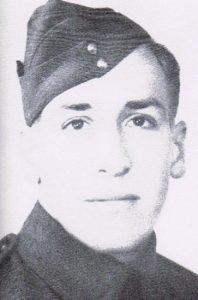
It’s just 20 years ago I learned about the toughest battle of Fred Barnard’s life. On a spring morning in 1944, our Uxbridge neighbour (then just 22) found himself on a landing craft with the Queen’s Own Rifles of Canada about to storm the Normandy beach codenamed Juno. He had no family in France that needed saving. He knew none of the German soldiers occupying those Norman towns and seaports.
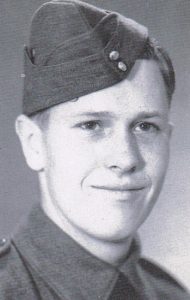
Still, he’d felt so compelled by the call for Canadians to help liberate the French from Nazi occupation that he and his brother Don travelled halfway around the globe to join the D-Day invasion on June 6.
“Give ’em hell,” Fred had yelled to his 20-year-old brother on the same landing craft.
Then, moments later, as he dashed for cover, among the first Canadians to penetrate Hitler’s Fortress Europe, Fred faced a horrific dilemma. There, in the sea water not yet ashore, he saw his brother with a bullet hole in his chest – dead before he’d even reached the sea wall. But love for his brother Don was trumped by a soldier’s duty not to stop. Said Fred years later, when he shared his tragic D-Day story with me, “I knew I had to go on. No matter what. Success depended on it.”
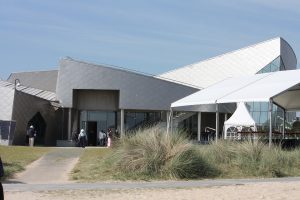
That day, nearly 78 years ago, Fred and Don Barnard risked everything to restore what is almost more precious to the French than life itself – Liberté! Freedom! Don paid with his life. Fred paid with four years of volunteer wartime service overseas, several wounds and the trauma of witnessing his brother’s death that first day on Juno Beach.
But thanks to the efforts of thousands of the Barnards’ fellow veterans and several generations of average Canadians who have donated to and have visited it, the Juno Beach Centre has stood on that very same beach since 2003 – commemorating how Fred and Don and 15,000 other young men like them from Canada helped restore a free France.
Today, however, just 19 years after Juno Beach Centre opened, Don Cooper, its president, says, “We face an existential threat.”
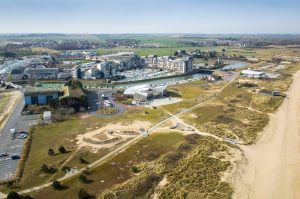
Foncim, a French property developer, has plans to build a private 70-unit condominium on the beach. For those of us who’ve visited Juno Beach Centre, we’ll note that the planned Domaine des Dunes project would rise some four stories (taller than the museum structure) where the sun rises over the River Seulles to shine on the very sand dunes where Canadians secured a toehold during the greatest amphibious invasion in history.
While Cooper and the museum have responded in a press release that they do not generally oppose projects on former battlefields, the actions of the developer and municipal politicians amounts to “trampling on our graves.”
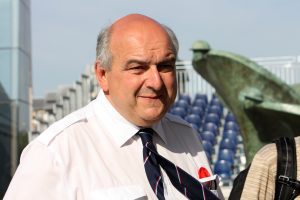
I attended the Juno Beach Centre opening in 2003. At the time, I met a Normandy resident and professional Jean-Pierre Benamou, who’d been instrumental in assisting Canadian veterans secure the former campground from the municipality as a unique tribute to Canada’s role in freeing France and the rest of western Europe from Nazi occupation.
Benamou, who also leads D-Day Academy tours for visiting Canadians says, “I don’t see an indignity with (condo) residents overlooking the museum. … But it’s local politics – a former mayor … who lost an election … having signed up with the builders.”
Until now, Juno Beach Centre has taken the high road, seeking to overturn the permit allowing condo construction, and raising very real concerns that condo construction would clog the only access road – preventing boaters access to their vessels, citizens moving around the village of Courseulles, and tourists attempting to visit Juno Beach Centre.
“The Centre attracted over 100,000 visitors in 2019, our best year ever,” Cooper said. “We’re just getting back to normal after the pandemic. (But) this will just be chaotic.”
The Centre has hesitated to exaggerate the threat for fear local residents in Courseulles or here in Canada would misinterpreted the response as “anti-French” sentiment. But Cooper also realizes Juno Beach – especially since the museum opened – has resonated powerfully among Canadians. So, the museum is now exploring the option to purchase the land from the developer to secure its use for the museum. And that will require a completely new fund-raising effort in Canada.
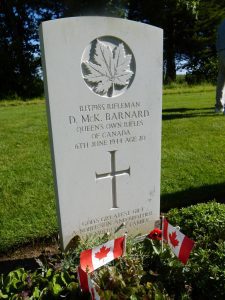
“We see the land becoming a Canadian memorial park,” an extension of the kiosks of commemorative bricks which brothers and sisters, sons and daughters, and D-Day veterans themselves have purchased over the years to remember the sacrifice made by Fred and Don Barnard 78 years ago, just metres from Juno Beach.
The Barnard brothers would not be deterred. Nor apparently will the Juno Beach Centre.
“We’ve received the torch,” Don Cooper said. “Now we have to carry it.”